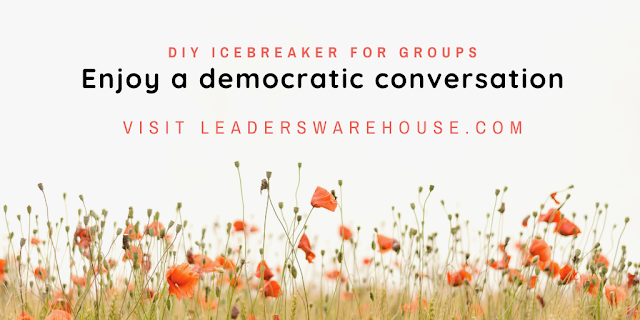Enjoy a democratic conversation
But what is a democratic conversation really?:
When it comes to describing what a democratic conversation is, it can very easily become both nerdy and long-winded. The article here should be read by everyone and especially those who geek out on conversations, examine them from all angles and evaluate them individually and compare them to other selected conversations.
A. A place to start might be to begin by delineating what a democratic conversation is and is not. For example, it is not a soliloquy, a monologue, a lecture, a one man show, a TV programme, a film, an opera, a play, a radio newspaper. These one-way soliloquies do not allow for dialogue and feedback.
B. A conversation takes place while you are fairly close to each other, in the same room, in the same car, each on his own phone.
C. A conversation consists of strings of words that both or all understand. The words are pronounced clearly and unambiguously and without too many repetitions.
D. A conversation includes sounds that can be understood by both or all, without difficulty, without too much translation, prompting, explanation or difficult words.
E. The conversation starts and ends in an understanding between those involved in the conversation, as if some kind of consent had been given by those involved.
F. The conversation proceeds in relatively good calm and order, without excitement and without expressions of displeasure, without oaths and curses, without obscenities, without insults. The words released are honest and relevant.
G. The intentions of the parties are sincere and interested. There is no reason for prejudice.
H. Nevertheless, the conversation turns into an undiscovered terrain with a tickling danger that the parties can no longer know or anticipate the reality that has not yet occurred.
I. Neither party will win the conversation. There is no winner in a democratic conversation. Or expressed a little more positively: There are only winners in a democratic conversation.
J. The parties gain new insight, new words, new discoveries, new ideas, new thoughts, - through the scriptless and planless conversation.
K. The parties can try to make notes along the way - if there is an agreement on this.
L. After a completed democratic conversation, the parties can agree on an outcome, a result, some key messages. What these will be used for is completely unknown, but can be agreed upon.
M. None of the parties will ever refer to the interview as a bad experience, because she or he was himself a decisive part of the interview held. It is too late to report the parties to outsiders later. The conversation belongs to the parties and stays with them.
N. The above looks like a set of rules for a democratic conversation that both or all parties should know. The parties can also decide to choose the rules of the game that must apply to their democratic conversation.
O. Another good basic rule must be that no one is ever afraid or uncertain about entering into a democratic conversation, nor stepping out of it.
Go directly to the exercise HERE
A. A place to start might be to begin by delineating what a democratic conversation is and is not. For example, it is not a soliloquy, a monologue, a lecture, a one man show, a TV programme, a film, an opera, a play, a radio newspaper. These one-way soliloquies do not allow for dialogue and feedback.
B. A conversation takes place while you are fairly close to each other, in the same room, in the same car, each on his own phone.
C. A conversation consists of strings of words that both or all understand. The words are pronounced clearly and unambiguously and without too many repetitions.
D. A conversation includes sounds that can be understood by both or all, without difficulty, without too much translation, prompting, explanation or difficult words.
E. The conversation starts and ends in an understanding between those involved in the conversation, as if some kind of consent had been given by those involved.
F. The conversation proceeds in relatively good calm and order, without excitement and without expressions of displeasure, without oaths and curses, without obscenities, without insults. The words released are honest and relevant.
G. The intentions of the parties are sincere and interested. There is no reason for prejudice.
H. Nevertheless, the conversation turns into an undiscovered terrain with a tickling danger that the parties can no longer know or anticipate the reality that has not yet occurred.
I. Neither party will win the conversation. There is no winner in a democratic conversation. Or expressed a little more positively: There are only winners in a democratic conversation.
J. The parties gain new insight, new words, new discoveries, new ideas, new thoughts, - through the scriptless and planless conversation.
K. The parties can try to make notes along the way - if there is an agreement on this.
L. After a completed democratic conversation, the parties can agree on an outcome, a result, some key messages. What these will be used for is completely unknown, but can be agreed upon.
M. None of the parties will ever refer to the interview as a bad experience, because she or he was himself a decisive part of the interview held. It is too late to report the parties to outsiders later. The conversation belongs to the parties and stays with them.
N. The above looks like a set of rules for a democratic conversation that both or all parties should know. The parties can also decide to choose the rules of the game that must apply to their democratic conversation.
O. Another good basic rule must be that no one is ever afraid or uncertain about entering into a democratic conversation, nor stepping out of it.
Go directly to the exercise HERE
Michael Meinhardt
LEADERSwarehouse.com
LEADERSwarehouse.com
☎ +45 71 92 55 63 ✉ info@LEADERSwarehouse.com





Comments
Post a Comment